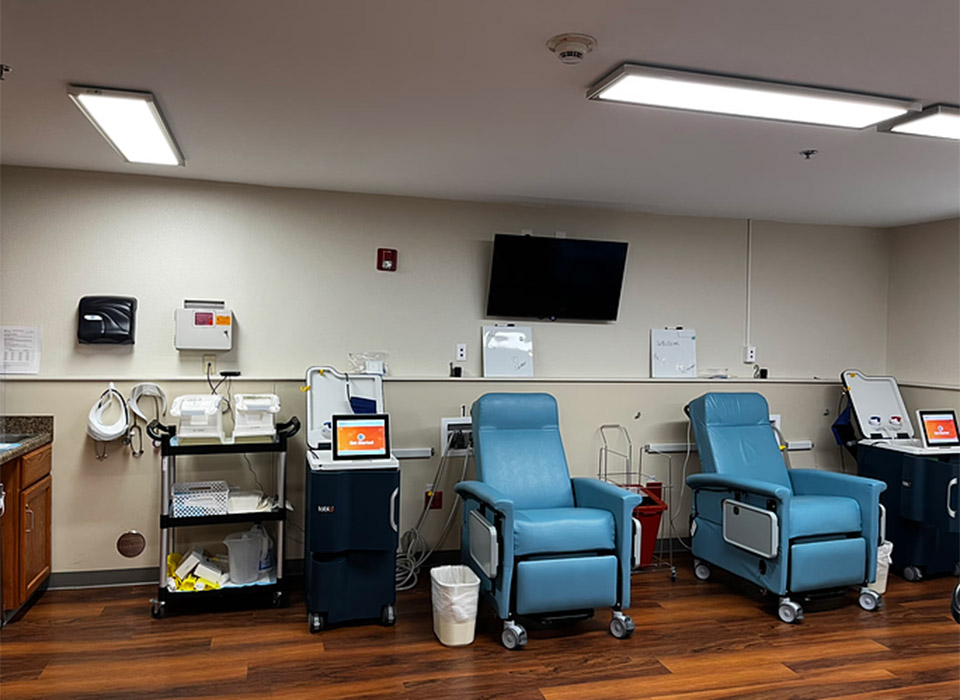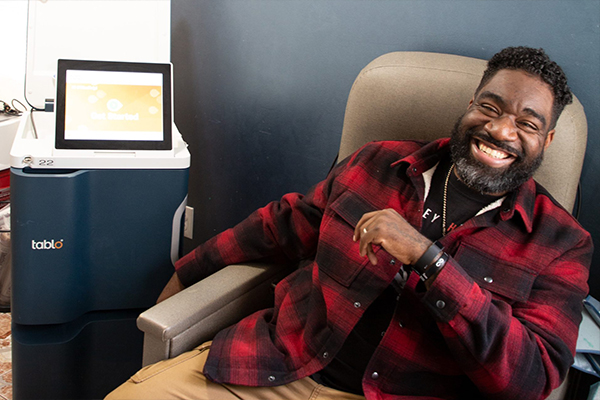In-House Dialysis for Skilled Nursing Facilities: Reducing Risk, Supporting Rehabilitation, and a Safer Path Home

Summary
For many skilled nursing facilities (SNFs), dialysis care takes place offsite. Several times a week, patients and residents must be transported to external centers for treatment, sometimes just down the road, other times miles away.
While this traditional model has been the standard for decades, it carries critical gaps in care continuity, rehabilitation, and facility efficiency. Hours spent in transit disrupt therapy schedules and staffing, while post-treatment fatigue limits participation in rehabilitation. Missed meals, fragmented communication, and reliance on manual coordination between SNF and dialysis teams can further compromise recovery, nutrition, and outcomes.
Carmen [kidney] HEALTH, a Texas-based boutique kidney care provider, saw firsthand how this traditional model created unnecessary barriers to healing and operational efficiency.
“It’s hard to fit in all the hours of rehabilitation that patients need to do when they’re being carted back and forth to a dialysis facility, not to mention that they feel pretty wiped out after dialysis,” said Erin Lamontagne, RN, Regional Nurse Manager.
For Molly Godley, RN, also a Regional Nurse Manager at Carmen [kidney] HEALTH, the issue hit close to home. She supported her father through hour-and-a-half drives for dialysis while he cycled in and out of SNFs, witnessing firsthand the toll of an outdated system. That experience, combined with the risks and costs of outsourcing dialysis, strengthened Carmen [kidney] HEALTH’s resolve to bring care closer to patients and families.
The solution: in-house dialysis with Tablo
Recognizing the challenges of outsourced dialysis, Carmen [kidney] HEALTH set out to transform how dialysis was delivered within their community SNFs. Instead of sending patients and residents offsite multiple times a week, treatments are now integrated into each individual’s plan or care. By providing staff-assisted dialysis on-site, treatments fit smoothly into rehabilitation schedules, eliminating the disruption of offsite transportation and improving the patient experience.
Implementing this model required the right technology that is safe, compliant, and practical for a SNF environment. Carmen [kidney] HEALTH selected a partnership with Outset Medical and adopted the Tablo® Hemodialysis System for their program. Its compact, integrated design combines the dialysis machine and water purification system into a single, mobile unit, fitting seamlessly into existing SNF spaces without the infrastructure demands of a traditional dialysis model.
“It’s a smaller footprint, so you can put more machines in there. It’s very versatile. It’s easy, easy, easy to use,” Erin said.
Training was another critical factor for the Carmen [kidney] HEALTH team. With Outset University, Carmen [kidney] HEALTH trains and certifies every team member, providing standardized education that meets regulatory standards. “That Outset University is absolutely amazing,” said Molly. “We actually use it with the Centers for Medicare & Medicaid Services to show that our team is trained on Tablo.”
By bringing dialysis in house with Tablo, Carmen [kidney] HEALTH’s team functions as an integrated extension of the SNF care team, collaborating closely while keeping operations efficient and compliant.
Saving a hospitalization with in-house dialysis
The impact of in-house dialysis with Tablo is most evident when the unexpected happens.
One weekend, Carmen [kidney] HEALTH’s team identified a patient with a critically low hemoglobin level of 6.8 g/dL, a dangerous threshold. Under an offsite dialysis model, this would have triggered a series of delays: canceled dialysis appointments, hospital transfer, interrupted rehab therapy, and days lost to testing and hospitalization.
Instead, with Carmen [kidney] HEALTH’s in-house program powered by Tablo, the response was immediate. The SNF and Carmen [kidney] HEALTH teams coordinated in real time. The patient received a transfusion without leaving the facility, and care continued without interruption.
When lab results confirmed the patient was stable, dialysis resumed right away. There was no missed treatment, no disruption to rehabilitation, and a costly hospital transfer was avoided. Care continued safely, efficiently, and comfortably within the facility.
“The patient was watching TV, going to his dinners, going to his therapy, totally relaxed,” Molly recalled. “We were able to save a hospitalization.”
Impact across residents, facilities and staff
Bringing dialysis in house generated immediate benefits for patients, families, and the SNF. The reason was clear: residents could maintain therapy schedules, preserve daily routines, and receive care from a consistent team without the exhaustion and disruption of frequent trips offsite.
“We went from three patients to 15 in a matter of three weeks,” Molly said.
For Carmen [kidney] HEALTH’s team, the shift brought its own significant improvements. On-site dialysis eliminated the need to coordinate multiple external providers and reduced miscommunication that often fragmented care. Consolidated operations allowed staff to focus fully on patient treatment and clinical outcomes.
In addition, the in-house model strengthened team cohesion and staff engagement. Since launching the in-house program, Carmen [kidney] HEALTH has experienced remarkable staff retention, which Molly credits to both Tablo’s intuitive technology and the strong relationships built within the team.
“People make the world of difference, in any way you look at it,” Molly explained.
Building a foundation with Tablo
Carmen [kidney] HEALTH views its SNF-based program as a foundation for continuity in dialysis care.
Because Tablo is compatible with both facility and home settings, residents gain familiarity with the system during their SNF stay. This experience builds confidence for patients and families, enabling a smoother transition to home dialysis and promoting independence, patient choice, and adherence to treatment plans.
Carmen [kidney] HEALTH’s program with Tablo also supports kidney preservation. For patients with acute kidney injury (AKI), Tablo’s flexible settings allow for gentler, individualized treatments. Some residents may only need temporary dialysis before regaining kidney function and discontinuing treatment altogether.
Looking ahead, Carmen [kidney] HEALTH plans to expand beyond Texas while continuing to innovate. Initiatives include exploring engagement tools, such as virtual reality, to enhance the comfort and patient experience during dialysis sessions.
As Erin put it, “If you want best-in-class care for your patients, this is the way to go.”
Redefining the standard of care with in-house dialysis
For too long, dialysis in SNFs has been limited by outdated practices and operational inefficiencies. Carmen [kidney] HEALTH’s in-house program with Tablo shows there’s a better way, one that integrates care, improves outcomes, and streamlines operations.
By bringing dialysis in house, aligning with home dialysis regulations, and using technology designed for integration and simplicity, SNFs can deliver care that is seamless, patient-centered, and clinically effective.
Most importantly, in-house dialysis programs help SNFs focus on what matters most: helping residents heal, regain independence, and return home.
As Molly reflected, “We want to help patients live their best life.”
To learn more about Carmen [kidney] HEALTH’s in-house program with Tablo, listen to the full discussion with Molly Godley and Erin Lamontagne here.
Quotes have been lightly edited for length and clarity.
Quotes have been lightly edited for length and clarity.
